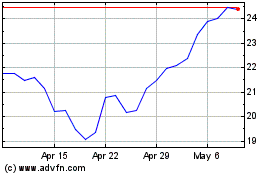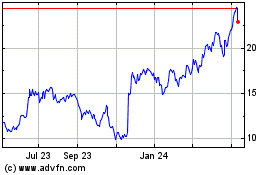BUENOS AIRES—Argentine President Mauricio Macri on Tuesday
declared an energy emergency, secured a $500 million shale-oil
investment and unleashed a backlash by bypassing the Senate to
temporarily appoint two Supreme Court justices by decree.
The day's activities reflected the dizzying pace Mr. Macri has
taken since he took office on Thursday to try to jump-start a
sickly economy and overturn a decade of his predecessor's
policies.
In five days, Mr. Macri has begun overhauling Argentina's
discredited statistics agency, eliminated most farm export taxes,
cut personal income taxes, replaced the central bank president, and
appointed two Supreme Court justices.
"Unfortunately, after a decade in which we've become less
competitive, we are in a situation of extreme, extreme
vulnerability," Mr. Macri said on Monday in a speech to
manufacturers. "That means we're up against the clock. We have no
time to waste."
This weekend, he met Argentina's 23 governors and the mayor of
this capital city to discuss reviving the economy. The meeting was
a jolt to Argentine politicians who had grown unaccustomed to
dialogue during 12 years of highly centralized rule by former
President Cristina Kirchner and her late husband, Né stor.
"I have been a governor for eight years and I have never been in
a meeting like that. Never," said Salta Province Governor Juan
Manuel Urtubey, a member of Mrs. Kirchner's opposition Peronist
party.
Some governors here have long said Mrs. Kirchner called on them
to share her ideas, but not to listen to theirs.
The Macri administration has been negotiating with foreign banks
to obtain billions in fresh financing, a break from the Kirchner
administration, which boasted it had stopped borrowing money
abroad. The government also announced it would cut subsidies that
make utility bills here among the cheapest in the world.Axel
Kicillof, Mrs. Kirchner's former economy minister, warned Monday
that raising utility rates could hurt the poor.
Mr. Macri's different tack is making an impression on many
Argentines. "Cristina appeared on television all the time and spoke
constantly. It was overwhelming," said Leandro Rotberg, 35, an
information technology specialist. "Macri isn't as verbose but he's
making his points. We need to give him time to fix the problems
he's inherited."
Argentina currently suffers from roughly 25% annual inflation,
the biggest fiscal deficit in three decades, a shortage of U.S.
dollars needed to pay for imports, and poverty that nears 29%.
Argentine exporters also say an overvalued currency makes local
goods uncompetitive abroad.
Mr. Macri, who beat Mrs. Kirchner's candidate in a tightly
contested runoff election in November, had just over two weeks to
name a cabinet and set up his administration before taking
office.Since his inauguration on Thursday, he has named nearly 20
cabinet ministers and traveled to Brazil and Chile to meet
Presidents Dilma Rousseff and Michelle Bachelet and discuss
trade.
Mr. Macri has already held full cabinet meetings, a departure
from Mrs. Kirchner, who didn't summon gatherings of all her cabinet
members.
The new president said he would eliminate currency controls this
week, ending a four-year policy that has choked economic
growth.
While economists welcome the move, it is widely expected to come
with a currency devaluation that could take the exchange rate to
around 15 pesos to the dollar from 9.8 currently. That could fuel
inflation, which rose faster in the first week of December than it
has since early 2014.
"Acting quickly and decisively is very positive for President
Macri, and frankly very positive for the country," said Susan
Segal, head of the New York-based think tank Council of the
Americas. "The faster he implements some of these measures, the
faster we'll see some of the benefits."
Not everyone agrees. "Macri is moving too quickly," said Carlos
Ponti, 44, an accountant in Buenos Aires. "He cut export taxes when
the country has a deficit. First he needs to balance the books,
then cut taxes."
Alfonso Prat-Gay, Mr. Macri's newly appointed finance minister,
has played down inflation risks, saying retailers have already
marked up prices. But other administration officials and economists
say there are risks.
Letting the currency depreciate too quickly could destabilize
the economy in the short-term, says Goldman Sachs economist Alberto
Ramos, while noting that delaying overhauls could raise opposition
to them in Congress, making it harder for Mr. Macri to get things
done later in the year.
"You want to be careful, but you don't want to hesitate too much
along that strategy because otherwise people start to question if
the adjustment was really necessary," Mr. Ramos said.
Mr. Macri's energy minister, Juan José Aranguren, on Tuesday
said the country's utilities sector was on the edge of collapse,
prompting the government to declare a state of energy emergency
through 2017 that lets the government push through conservation
policies to fend off the power blackouts that have plagued Buenos
Aires and surrounding areas for years.
Mr. Macri's move on Tuesday to bypass the Senate and temporarily
appoint two Supreme Court justices by decree elicited a strong
reaction, but the controversy seemed to settle somewhat after the
chief justice said he would welcome the new judges to the
court.
"This is President Macri's first and grave mistake,"
Congresswoman Margarita Stolbizer said in a post on Twitter.
"Appointing justices to the Supreme Court by decree is a terrible
institutional setback."
Meanwhile, Mr. Macri has said his top focus will be the
economy.
Early Tuesday, after meeting with chief executives from the
state-run oil company, YPF, and the local unit of Dow Chemical Co.,
he said the companies would invest $500 million in 2016 to explore
for shale gas.
It was the first of what he said he hoped would be many private
sector announcements to boost investment in Argentina.
"We should be optimistic about the future," Mr. Macri said,
"even though we have a complicated present."
Ryan Dube
Write to Taos Turner at taos.turner@wsj.com
(END) Dow Jones Newswires
December 15, 2015 20:35 ET (01:35 GMT)
Copyright (c) 2015 Dow Jones & Company, Inc.
YPF Sociedad Anonima (NYSE:YPF)
Historical Stock Chart
From Mar 2024 to Apr 2024

YPF Sociedad Anonima (NYSE:YPF)
Historical Stock Chart
From Apr 2023 to Apr 2024
